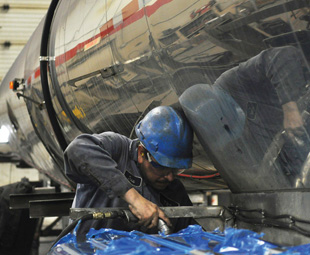Woe is trailer maintenance

It is often forgotten that the trailer is just as important a part of the vehicle as the horse. GAVIN MYERS speaks to Hans Theunissen, founding member of preventative maintenance specialists Healthy Transport, as well as Billy Theunissen, operations director, to find what operators are – and aren’t – doing with their trailers
The news is not good … trailer maintenance does not seem to be taken as seriously as that of the truck tractor – and the neglect is on the increase.
“Trailers are often just seen as a chunk of metal that is dragged behind a truck tractor,” the men suggest. “The cost of trailer repairs is often a reason to ‘let it go until a later stage’, as the downtime and loss of revenue does not ‘allow’ for the unit to be pulled off the road for repairs or maintenance.”
The unfair result of this is that these operators “who do not really have a road safety conscience” tend to acquire tenders because their prices are lower…
 “Companies that put out their transport/distribution needs on tender should be able to prove that trailers are properly maintained and have records of quality servicing readily available. Not many transport operators could meet this requirement,” they say.
“Companies that put out their transport/distribution needs on tender should be able to prove that trailers are properly maintained and have records of quality servicing readily available. Not many transport operators could meet this requirement,” they say.
Other than unscrupulous dealers winning contracts, poor trailer maintenance has a number of knock-on effects. Wear on the fifth wheel (including loose and/or dry fifth wheels and dry trailer skid plates) has a direct impact on the components within the truck-tractor driveline and steering system. “Dry fifth wheels and trailer skid plates cause the truck and trailer to run out of line,” they add.
Furthermore, poor maintenance of suspension components and wheel alignment increases tyre wear as well as fuel consumption – which is also impacted by air leaks. “In fact, insufficient compressed air could lead to brake inefficiency on the trailer,” they note. “Compressed-air brake leaks are most often not seen as a critical defect and are overlooked, and far too often repairs that are undertaken are of a poor quality.”
Finally, poor maintenance on axles and axle components could lead to total axle failure, resulting in breakdowns or accidents.
What can be done to improve the situation? The most important aspect is a renewed focus on diligent, high-quality maintenance. “The excuse ‘just one more trip’ and running for ridiculous periods before a service – never mind a lack of scheduled maintenance intervals and records – result in un-roadworthy trailers on the road … which creates a major accident risk.”
 The men suggest that drivers need to play an integral role in fixing this situation, but often do not have mechanical appreciation or the knowledge to identify and report defects. They may also not have the authority to ensure these defects are attended to before going on the road.
The men suggest that drivers need to play an integral role in fixing this situation, but often do not have mechanical appreciation or the knowledge to identify and report defects. They may also not have the authority to ensure these defects are attended to before going on the road.
“Drivers must be taught to be diligent, to the point of being a pain in the backside, when they do truck and trailer pre-trip and on-road inspections. Somehow drivers need to be protected when they report defects and no action is taken … they are sometimes threatened with their jobs if they don’t go out on the road…”
Finally, trailer workshops must be considered. “Trailer mechanics are not sufficiently trained to identify defects and fix them in time and on time … plus, there is a general lack of supervision and quality control! Trailer workshops are sadly lacking properly qualified staff,” the men note.
So, the news is definitely not good at all. However, kudos must go to those operators who take
the task of trailer maintenance seriously as, without them, the situation would surely be far worse.
Published by
Focus on Transport
focusmagsa




